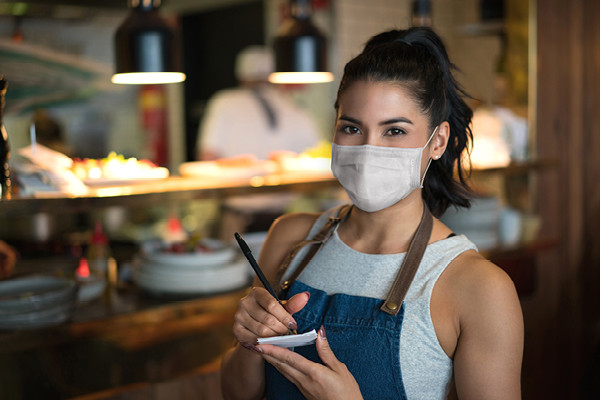
Soapbox: Stephen Finch on the 2 metre barrier to trade
Asking for rational trade-offs, Vagabond’s Stephen Finch voices the on-trade’s concern over the economic impact of shut-down and the 2 metre distancing rule.
We all know Sars-Cov-2 is absurdly infectious. But why is no one in government or the major media talking about the fact that Covid-19, the disease caused by that virus, is overwhelmingly dangerous to only two small segments of the population? For the vast majority Covid-19 is proving less fatal than the seasonal flu.
What’s more, both vulnerable segments are easily identifiable – the elderly and the immunocompromised – which means we could have incurred far less destruction and avoided far more non-Covid-19 deaths while providing far more dedicated resources to protect those segments than we have to date.
My sense is we ended up where we are because the government’s response, while correct and admirable at the beginning of the outbreak, somehow stopped involving a coherent, rational, objective assessment of the facts and started ignoring basic cost/benefit analysis. General panic and muddled thinking seem to have taken over. (When the prime minister thankfully recovered from Covid-19 I worried he would behave “once bitten, twice shy” and that seems to be proving true.)
Case in point – not all measures to prevent the spread of a virus, let alone Sars-Cov-2, are equally effective. Nor are they equally costly. Frequent washing of hands is far and away the most effective thing people can do to lower the risk of acquiring the virus. It’s also virtually cost-free. Face masks are somewhat effective – at least in terms of preventing transmission to others; not so much vice versa – and, while they’re a visible daily reminder of the terrible situation, they’re also fairly low cost. So that’s two tactics that, between them, probably account for 80% of the realistically achievable suppression of virus transmission. And for very little societal cost.
And this 2 metres social distancing thing? That’s low efficacy and high cost – precisely the sort of thing a rational, clear-thinking policymaker should not countenance. It’s telling that the World Health Organisation recommends 1 metre, yet the UK is virtually alone in the world at 2 metres. The WHO released a study demonstrating that “people have just a 2.6% chance of catching coronavirus if they stand 1 metre away from an infected patient”. The incremental reduction in transmission risk from a 2 metre policy is minimal, “reducing the risk to around 1.3%”. The economic damage from that extra metre is massive. Most hospitality businesses are not viable under 2 metres social distancing. Then add on the lost productivity from thinned out offices, schools, etc. All that destruction for such little benefit. What a waste.
I guess I can take comfort from the fact that other countries have started to reopen and – surprise – the sky hasn’t fallen. The more people experience that reality, the more we can hope the UK will more confidently and expeditiously reopen the economy while protecting the vulnerable.
Currently, Vagabond is open for takeaway and delivery at our more residential outlets, and our Northcote Road site doubles as a fulfilment centre for the webstore, which we set up at the beginning of the lockdown. We’re not going to make much money out of any of this; it’s more about keeping the brand alive, allowing some staff to earn full pay and making sure venues are looked after.
We’re preparing to open most Vagabonds for on-trade activities on 4 July. This will be primarily those with sizeable outside areas, which most fortunately have. Yes, we’ve assorted Covid-19 policies and procedures in place like everyone else, but we’re not going to go overboard with massive plastic shields and temperature guns. Maybe four weeks ago people would want to see a Plexiglass bunker but I think now that people have been out, they’re absolutely done with the lockdown. They’re ready to live life again. And let’s not forget, people are smart and capable. They will be careful.
Hospitality operators are resourceful and determined. We will find a way to make sensible social distancing work, and we’ll do what we must to ensure a safe yet enjoyable environment. But we still need clarity from the government about what makes a place ‘Covid secure’? Our guests will need reassurance that we’re fully in compliance with this newly created standard – 4 July will be here before we know it, and we need to start making plans now.
I understand that the government is in a tough spot, with momentous decisions to take in the midst of great uncertainty. But if the phrase “we’re in this together” is to mean anything, it needs to start trusting the people more. We need the government to make decisions that assume people are responsible and sensible. If it does, we’ll get through this virus crisis quicker and more intact than the current trajectory suggests.
Keywords:
- wine
- Opinion
- Restaurants
- Bars
- alcohol
- vagabond
- hospitality
- Stephen Finch
- drinks trade
- sports
- Covid-19
- social distancing
- WHO
- 2 metre rule
- 1 metre
- physical distancing
- on-trad reopening
- Soapbox
- virus transmission






